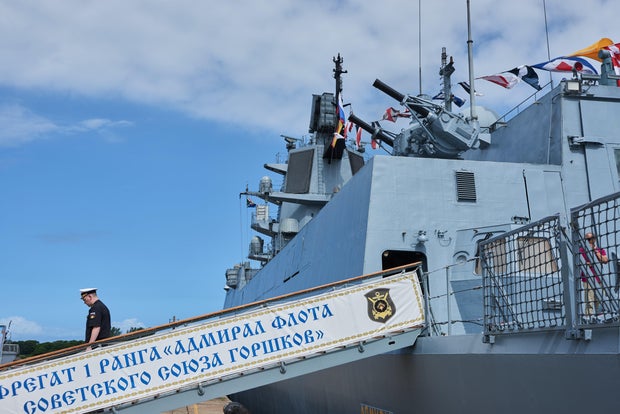Three Russian ships and a nuclear-powered submarine are expected to arrive in Cuba this week ahead of military exercises in the Caribbean, officials said. While the exercises aren’t considered a threat to the U.S., American ships have been deployed to shadow the Russians, U.S. officials told CBS News.
The Russian warships are expected to arrive in Havana on Wednesday and stay until next Monday, Cuba’s Foreign Ministry said in a statement. A U.S. official told CBS News national security correspondent David Martin the U.S. intelligence community has assessed that the submarine in the group is nuclear powered but it isn’t carrying nuclear weapons.
“We have no indication and no expectation that nuclear weapons will be at play here in these exercises or embarked on those vessels,” White House national security spokesman John Kirby told CBS News senior White House and political correspondent Ed O’Keefe last week.
What Russian ships are arriving in Cuba?
According to the Cuban Foreign Ministry, the three Russian ships are a frigate, a fleet oil tanker and a salvage tug. The three ships and the submarine were heading across the Atlantic separately, the U.S. official told Martin.
Two American destroyers and two ships that tow sonar equipment behind them are shadowing the submarine, the U.S. official told Martin. Another destroyer and a U.S. Coast Guard cutter are shadowing the three Russian ships.
The ships’ arrival in Havana — which the Cuban Foreign Ministry said is expected to include the fanfare of one Russian ship firing 21 salvos in a salute to Cuba — comes ahead of Russia carrying out air and naval exercises in the Caribbean in the coming weeks, a different U.S. official told Martin.
The exercises, which will include long-range bombers, will be the first simultaneous air and naval maneuvers Russia has carried out in the Caribbean since 2019, the U.S. official said. The exercises will be conducted over the summer, culminating in a worldwide naval exercise in the fall.
“Clearly this is them signaling their displeasure about what we’re doing for Ukraine,” Kirby told O’Keefe. “So we’re going to watch it, we’re going to monitor it, it’s not unexpected. … But we don’t anticipate, we don’t expect that there’ll be any imminent threat or any threat at all, quite frankly, to American national security in the region, in the Caribbean region, or anywhere else.”
The U.S. official told Martin the ships may also visit Venezuela.
What was the Cuban missile crisis?
The events in the Caribbean are different from the Cuban missile crisis that happened over 60 years ago. The 1962 crisis unfolded after the U.S. discovered launch sites in Cuba for Soviet ballistic nuclear missiles.
Over the course of 13 days, the crisis brought the Soviet Union and the U.S. dangerously close to nuclear war. A potential conflict was averted when the Kennedy administration reached a deal with the Kremlin for the missiles to be removed from Cuba.

